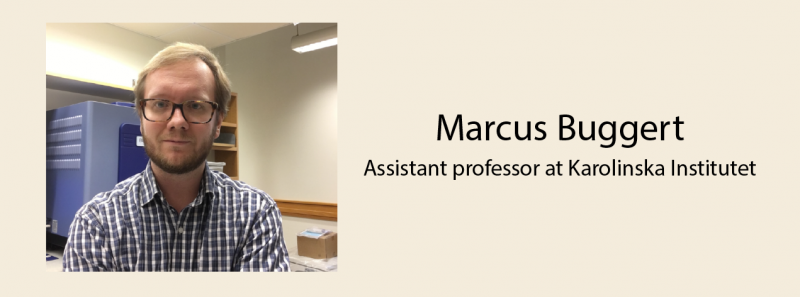
“Having the inner drive”
Name: Marcus Buggert
Did PhD at: Karolinska Institutet
Current position: Assistant professor at Karolinska Institutet
Interviewed by: Christine Zimmer
Thinking about the next step in his career, Marcus Buggert already contacted his future boss during his time as a PhD student and is today successfully building up his own group at Karolinska Institutet.
Experience:
Masters in Biomedicine at Karolinska Institutet 2004-2009,
Research Assistant at Karolinska Institutet 2009-2010,
PhD at Karolinska Institutet 2010-2014,
Post doc at University Pennsylvania School of Medicine 2014-2017,
Post doc in collaboration with Karolinska Institutet 2015-2018
Current position: Assistant professor 2018
“I always wanted to do a postdoc”, Marcus says right away when we start talking about his career. As a PhD student, Marcus focused on understanding T cell exhaustion in HIV. Despite his fascination for science not everything went according to plan. “My boss started a family and went on maternity leave, a good opportunity to become independent quickly”. Marcus used this time to think about his career and different options to meet experts in the field of virus immunology, particularly HIV. “I was interested in spending some time in Michael Betts´ lab in the US and he accepted me”. Marcus used his short stay in the US as opportunity for networking and in fact got a postdoc position in the same group. In the same year he obtained his PhD, Marcus received an international postdoc grant and continued his career at the University of Pennsylvania under the mentorship of M. Betts and J. Sandberg at KI.
Changing the environment is not always easy and Marcus reflects upon his experience. Marcus has always been focused on exploring human infectious diseases and was suddenly in an environment where most people were using mouse models. “I ended up in a pushy environment, where people looked at my work from a “mouse” perspective”, he says. However, he soon understood that doing “good science” can be seen from different angles. “I learnt a lot from how to select useful comments and implement them in my projects. It made me think about if we are really good at what we are doing and was a fantastic education”, Marcus adds. He admits to have experienced differences in culture and mentality, but immediately starts to smile adding “I had a group of good friends and wanted to stay”.
Coming back to Sweden after his postdoc Marcus thought about leaving science for the first time during his career. “Even though I had some experience in writing grant applications, people were not always optimistic that I will succeed”. Marcus underwent a time when he had some doubts in regard to his future career in academia. He speaks about it as stressful period, but finally made the decision to apply for a starting grant from Vetenskapsrådet.
“I got the grant”, Marcus happily says. He got the opportunity to establish himself as an independent researcher. Building on what he has started doing during his time as postdoc, Marcus is setting up his own lab. He focuses on the diversity of memory CD8+ T cells in lymphoid tissues in health and infectious diseases. Still being fascinated by science, he peruses his projects. Current challenges he is facing are competition in the field and of course being worried about money and his work life balance, mentioning his two kids. “You need to have the inner drive and the interest to succeed, otherwise an academic career is too challenging”.
Photo: Adapted from original provided by Marcus himself
This career portrait was originally written for the PhD course “Career skills for scientists”, organized every spring by KI Career Service. As explained in the introduction post, all participants in the course interviewed PhD holders with an academic or a non-academic career. Keep an eye on the tags #careerportrait, #InsideAcademia and #OutsideAcademia listed below, for a selection of these portraits. Get inspired and learn more about your options for your post-PhD career!

0 comments